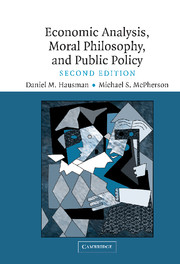Book contents
- Frontmatter
- Contents
- Preface
- INTRODUCTION
- I RATIONALITY AND MORALITY
- 4 Rationality
- 5 Rationality in Positive and Normative Economics
- 6 Rationality, Norms, and Morality
- II WELFARE AND CONSEQUENCES
- III LIBERTY, RIGHTS, EQUALITY, AND JUSTICE
- IV MORAL MATHEMATICS
- CONCLUSIONS
- Appendix: How Could Ethics Matter to Economics?
- Glossary
- References
- Index
5 - Rationality in Positive and Normative Economics
Published online by Cambridge University Press: 06 July 2010
- Frontmatter
- Contents
- Preface
- INTRODUCTION
- I RATIONALITY AND MORALITY
- 4 Rationality
- 5 Rationality in Positive and Normative Economics
- 6 Rationality, Norms, and Morality
- II WELFARE AND CONSEQUENCES
- III LIBERTY, RIGHTS, EQUALITY, AND JUSTICE
- IV MORAL MATHEMATICS
- CONCLUSIONS
- Appendix: How Could Ethics Matter to Economics?
- Glossary
- References
- Index
Summary
Positive economics is concerned with the explanation and prediction of economic phenomena, while normative economics is concerned with evaluating economic policies, practices, and states of affairs from a moral stand-point. Rationality is a normative notion concerning how people ought to choose, prefer, or reason, so it may seem surprising that it plays a large role in positive economics. Since rationality is different from morality, it may also seem surprising that rationality plays a large role in normative economics. But in fact rationality is ubiquitous in both positive and normative economics.
Rationality and Positive Economics
People's preferences are rational if they are complete and transitive, and people choose rationally if their choices are determined by their preferences. If one adds to this theory of rationality the generalization that consumers are to some extent rational and that they prefer more commodities to fewer, then one has the central principles of the positive theory of consumer choice. Similarly, the traditional theory of the firm maintains that firms or entrepreneurs are rational and that they combine inputs so as to maximize the difference between revenues and costs. Though the theory of consumer choice and the theory of the firm make additional claims, they both take the theory of rational choice to be the theory of actual choice.
Positive economics on both the consumer and the producer side can be formulated without using the word “rational.” Rather than first defining “rational” and then stating that individuals are rational, one can assert that the preferences of individuals are complete and transitive and that individuals choose whatever affordable bundle of commodities they most prefer.
- Type
- Chapter
- Information
- Economic Analysis, Moral Philosophy and Public Policy , pp. 60 - 77Publisher: Cambridge University PressPrint publication year: 2006



